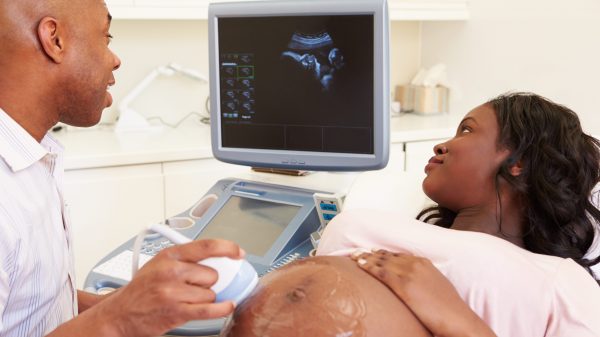26 U.S. hospitals are making a difference when it comes to Black maternal care
A new report found that 26 hospitals across 13 states have high success rates in supporting Black maternal patients experiencing […] The post 26 U.S. hospitals are making a difference when it comes to Black maternal care appeared first on TheGrio.

A new report found that 26 hospitals across 13 states have high success rates in supporting Black maternal patients experiencing complications.
When the topic of Black maternal health is mentioned, it’s often because of the alarmingly high Black maternal mortality rates around the country and the ways in which modern health care fails so many birthing people, particularly Black women. Rarely is it about what care providers are getting right.
However, according to a recent report by U.S. News, there are currently 26 high-performing maternity care hospitals across 13 states doing just that, raising the bar for what culturally competent care can look like.
“For Black Maternal Health Week 2024, we celebrate these hospitals’ success in their important work supporting and advancing Black maternal health as part of U.S. News’ ongoing commitment to health equity and our support of women’s access to maternity care,” Jennifer Winston, Ph.D., health data scientist at U.S. News said in a release.
Specifically, the 26 hospitals listed are “achieving excellent outcomes for cesarean section and unexpected newborn complications among Black patients.” The hospitals identified by the publication served at least 20 Black patients per year and had newborn complication rates of less than 2.62% and C-section rates of less than 23.9% (among hospitals providing a higher level of care) or 23.6% (among hospitals not providing a higher level of care) among Black patients.
The 26 high-performing hospitals include:
- Allina Health United Hospital (Saint Paul, MN)
- Arrowhead Regional Medical Center (Colton, CA)
- Atrium Health Pineville (Charlotte, NC)
- Aurora Medical Center-Grafton (Grafton, WI)
- Bakersfield Memorial Hospital (Bakersfield, CA)
- Bethesda North Hospital (Cincinnati, OH)
- Capital Health Medical Center-Hopewell (Pennington, NJ)
- Carilion Roanoke Memorial Hospital (Roanoke, VA)
- Henry Ford Wyandotte Hospital (Wyandotte, MI)
- Kaiser Permanente Westside Medical Center (Hillsboro, OR)
- Lakeland Regional Health Medical Center (Lakeland, FL)
- Methodist Hospital of Sacramento (Sacramento, CA)
- Miami Valley Hospital (Dayton, OH)
- Novant Health Forsyth Medical Center (Winston-Salem, NC)
- Novant Health Matthews Medical Center (Matthews, NC)
- Overlook Medical Center (Summit, NJ)
- Pomona Valley Hospital Medical Center (Pomona, CA)
- Saint Francis Hospital-Tulsa (Tulsa, OK)
- Sentara Martha Jefferson Hospital (Charlottesville, VA)
- St. Catherine Hospital-East Chicago (East Chicago, IN)
- Sutter Delta Medical Center (Antioch, CA)
- UNC REX Hospital (Raleigh, NC)
- UPMC Magee-Womens Hospital (Pittsburgh, PA)
- Virtua Our Lady of Lourdes Hospital (Camden, NJ)
- WakeMed Cary Hospital (Cary, NC)
- WakeMed Raleigh Campus (Raleigh, NC)
This list arrives at a time when much is at stake for Black birthing people. In 2021, the Centers for Disease Control and Prevention observed that the maternal mortality rate for non-Hispanic Black women was 69.9% deaths per 100,000 live births, 2.6 times the rate for non-Hispanic white women.
Black Maternal Health Week, which kicked off on April 11 and runs through April 17, is in its seventh year. Originally founded by the Black Mamas Matter Alliance, the week’s focus aims to bring greater awareness, increase activism, and amplify the voices and lived experiences of Black mothers and birthing people. In consideration of how many states are currently battling over restrictive reproductive rights, this year’s theme is “Our Bodies STILL Belong to Us: Reproductive Justice NOW!”
Dr. Yolanda Lawson of the Black Directors Health Equity Agenda told U.S. News the solution to equitable care won’t be one-note.
The Texas-based OB/GYN said, “It’s not one individual; it’s not one entity that’s going to solve this problem. It’s going to take a community and a collaborative approach to solve this problem. It needs to be well-informed. It’s gonna take policymakers, it’s gonna take hospitals, it’s going to take doctors.”
Never miss a beat: Get our daily stories straight to your inbox with theGrio’s newsletter.
Recommended Stories
- 3 areas of focus to support moms-to-be and moms’ physical and mental health
- Kyla Pratt recalls dealing with dismissive health care provider while giving birth to second baby
- There’s life after heart failure — this Black woman is endeavoring to prove it
- Push presents, with their binary and biological slant, can be unnecessarily offensive
- The overturning of Roe v. Wade almost took my wife’s life
- Halle Bailey opens up about why she chose a private pregnancy
- Dangers and deaths around Black pregnancies seen as a ‘completely preventable’ health crisis
- The wisdom Viola Davis shares with her tween daughter is great advice for women, too
The post 26 U.S. hospitals are making a difference when it comes to Black maternal care appeared first on TheGrio.












